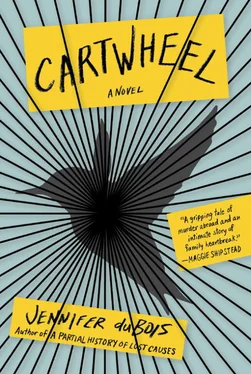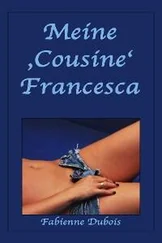“You’ll like them one day,” he’d heard Maureen say.
“I won’t,” said Lily miserably. “I got a 2300 on the SAT. I am never going to like them.”
“You got a 2280,” said Maureen.
Lily dressed them with varying degrees of success; in the heat, she tended to dress them very inadequately indeed. In the Facebook picture, she was wearing something ridiculous—some spaghetti strap thing, Andrew didn’t know what to call it—and they (the breasts) were simply not battened down in any serious way at all. Andrew blamed Maureen for this, somehow; some important, delicate conversation had been missed, somewhere along the line, and now here they all were, staring at this photo, which contrasted so starkly with Katy’s neat hair and sparkling teeth and compact body—all of it somehow virginal, somehow the particular beauty of an innocent.
Between Lily and Katy was a picture of Sebastien LeCompte—that name! In the photo, he appeared young, foppish, with overlong hair that reminded Andrew of some kind of ornithological plumage. The idea of this boy inspiring murderous lust was absolutely comic. Andrew was going to actually laugh about it, in fact, just as soon as he got out of this office.
“I’m sorry, but this guy?” Andrew tapped the photo. “Really? You’re expecting me to believe those two girls were fighting over this guy?”
“We’re not expecting you to believe anything,” said Ojeda. “But it’s what the prosecution will assert, and we have to assume that the panel will believe it.”
“Why?”
“There is some evidence,” said Velazquez. “A few emails the deceased wrote, indicating a new romance that she needed to hide from your daughter. And Carlos Carrizo—that’s the host family father—”
“I know,” said Andrew.
“—Has grudgingly admitted to seeing the deceased return from LeCompte’s house late one evening. But in terms of the trial, what your daughter believed to be the case is more important than what was actually the case, as I’m sure you understand. And your daughter believed that the deceased and Sebastien LeCompte were romantically involved. She said as much in her initial interrogation.”
“Are these really the concerns of law enforcement, though?” Andrew sat back heavily in his chair. “I mean, it all seems a little—tawdry. And, frankly, trivial.”
Ojeda blinked, impassive. “Your daughter’s emails characterize her relationship with the deceased as fraught, at best,” he said. “The love triangle element establishes a motive. And then there’s the question of your daughter’s behavior on the day of the murder.”
“You mean, trying to administer CPR to a dead body and then calling the police?” said Andrew. “You mean, doing exactly what she was supposed to do?”
“We’re not as concerned about the blood the truck driver saw on Lily’s face,” said Ojeda. “Lily found the body of the deceased, as you say, and we have every confidence that the DNA report will support that story. What’s somewhat more worrying for our case, actually, are the reports from the initial interrogation of your daughter’s rather … subdued … reaction to Katy’s death. And in conjunction with the cartwheel, of course, that looks a little strange.”
Andrew felt his tongue freeze momentarily in his mouth. “What cartwheel?” he said.
The lawyers exchanged another glance. “You didn’t know about the cartwheel?” said Velazquez.
“She did a cartwheel?”
“During the interrogation.”
“ During the interrogation?”
“Afterward. Right after the first interrogation, when they left her alone.”
“Okay,” said Andrew, his tongue unfreezing. “Well. That’s odd, I suppose. But I don’t really know what it has to do with anything. I mean, maybe she just wanted to stretch? Maybe she hadn’t moved in a while? At any rate, I just don’t see how it matters at all.”
But he did, and the lawyers could see that he did, and that they did not need to explain.
“Finally,” said Ojeda apologetically. “There’s this.” He clicked a remote at the TV, summoning a black-and-white image of Lily and Sebastien LeCompte, who appeared to be shopping at some kind of Walmart-type store.
“What is this?” said Andrew.
“Security footage. From the day of the murder.”
“Why are we watching this?”
“You’ll see.”
On the screen, Lily and Sebastien were grainy and grim, moving in that strange halting way—disappearing and suddenly rematerializing three feet away—that was particular to people on security tapes. Andrew leaned forward. They looked guilty, and why was that? He realized it was because you only ever saw people on security footage when they were suspected of a crime; the way they dropped out of sight and then popped back up began to seem intentional, furtive. On the screen, Lily and Sebastien looked ghostly and very young. They moved through the store picking out basic, sensible things—a toothbrush, some toothpaste, the necessities for a person locked out of a house. At the end of one aisle, Lily lingered and, incredibly, produced a pack of cigarettes from her pocket. She put one in her mouth without lighting it. Andrew felt a muted, faraway surprise that he knew, under any other circumstances, would be much larger—he had never known his daughter to smoke. On the screen, Lily turned to look at Sebastien and nodded toward the shelf behind her—which, Andrew could see now, was lined entirely with condoms. She raised an eyebrow and Ojeda paused the tape, freezing Lily’s face into an expression of strange, nearly vulpine suggestiveness.
“That,” said Velazquez, pointing, “is what they’re going to play.”
“Who?”
“The television.”
“What?”
“That she gave him this provocative look with the condoms.”
“I wouldn’t really say it’s provocative,” said Andrew, even though he knew it didn’t matter. He was beginning to see how this was going to go. “I mean, it’s not like she bought them, right? It’s just kind of silly, I think.”
“You have to understand, this is five hours after she’s learned of Katy’s death,” said Velazquez.
“She’s just making a joke,” said Andrew.
And Velazquez looked at Andrew blankly and said that that’s exactly what he meant.
On Thursday, Andrew and Anna took a taxi to Lomas de Zamora police station.
“Aren’t you hot?” said Andrew. He had told Anna to wear something modest, and now she was wearing a high-necked sweater and he worried she was hot. He was hot.
“No,” said Anna. She was resting her head on the window. Andrew managed not to comment on this, though he flinched every time they hit a bump. He had to figure that she’d quit it if she wanted to quit it.
From the outside, the police station looked normal enough—like a place you might voluntarily go, certainly, if you were in some kind of trouble. Andrew reminded himself for the hundredth time that this wasn’t Russia: This was a country where you were encouraged, on balance, to find the police if you had a problem. Inside, Andrew and Anna were conducted through a multi-phased entrance; they relinquished their documents to a man in a lucent box and were ushered into a small waiting room. Andrew was again relieved: The walls were papered with flyers for social service programs, and there wasn’t a single festering wound or homicidal gang in sight. The huge light on the ceiling was spackled with the desiccated bodies of a few electrocuted flies, some of them still twitching; in the corner of the room lurked an enormous spindly-legged bug, as grand and improbable looking as a lobster; the smell of cloying disinfectant half-obscured the smell of something heavily organic. But in general, the room looked okay—like a place where petty obligations were fulfilled. A DMV, perhaps. Though Andrew saw how this place’s innocuousness could be dangerous; maybe it was why Lily had not realized the threat she was under—letting things go on in Spanish, failing to ask for a lawyer. He could scarcely believe it about the lawyer. Hadn’t she watched enough TV growing up to know to reflexively demand one, no matter what? Perhaps she actually hadn’t—they’d been stingy with TV, allowing only the most tedious and high-minded of programming, protecting their daughters from exposure to the mind-coarsening and the lurid. How funny that the most important thing Lily would wind up needing to know would be, essentially, a cliché, a little beat of verisimilitude in the preordained rhythm of a crime drama. How darkly hilarious, that this would turn out to be what they’d most needed to teach her. But instead they had raised an unworldly daughter; a child so confident in her language skills (a 5 on the AP exam, after all!), and so proud of the sophistication of her reasoning abilities (those papers on Quine!), and so assured of the infallibility of her innocence (!) that she assumed, wrongly and bravely, that her rational goodness could prevent disaster—even though the thesis of all of their lives had been that this was not so. How strangely funny that was. Andrew was going to laugh about that. Andrew was going to laugh about all of it, just as soon as he got out of this jail.
Читать дальше












